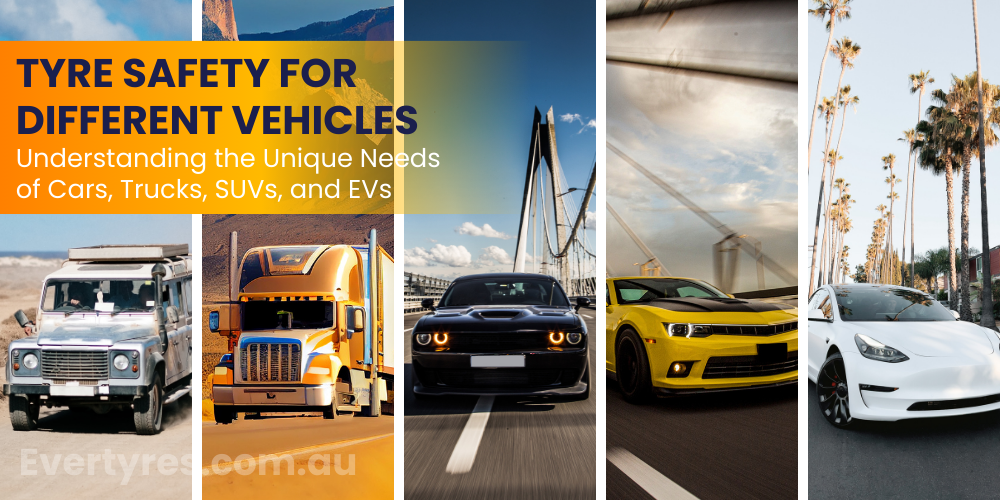Tyre Safety for Cars, Trucks, SUVs & EVs
Table of Contents
I. Introduction
1 Cars: Striking a Balance Between Performance and Comfort
Load capacity
Speed rating
Tread wear
Fuel Efficiency
Noise Reduction
2 Trucks: Meeting the Demands of Heavy Loads
Load capacity
Ply rating
Off-road capabilities
Commercial Tyres
3 SUVs: Balancing Performance and Off-Road Capability
On-road use
Off-road use
All-Terrain Tyres
Comfort and Noise Reduction
Passenger Safety
4 Electric Vehicles (EVs): Addressing Unique Requirements
Low rolling resistance
High load capacity
Noise reduction
Weight Distribution
II. Tyre Maintenance
1. Inflation Pressure
2. Tyre Rotation
3. Alignment and Balancing
4. Wear and Tear
III. Conclusion
IV. FAQs
Introduction
Tyre safety is a critical aspect of vehicle maintenance, and it becomes even more significant when considering the diverse range of vehicles on the road today.
Cars, trucks, SUVs, and electric vehicles (EVs) each have unique characteristics that demand specific attention when it comes to tyre maintenance, highlighting key factors such as load capacity, speed ratings, and tyre pressure requirements.
Cars: Striking a Balance Between Performance and Comfort
Cars, with their varied designs and purposes, require tyres that cater to different driving conditions. For everyday commuting vehicles, it's essential to prioritize factors like fuel efficiency, tread life, and ride comfort. Additionally, understanding the load capacity of the tyres is crucial for maintaining safety and performance.
Load capacity: Passenger cars typically have a lower load capacity than other vehicles. Choose tyres with a load rating that can handle the maximum weight your car will carry regularly.
Speed rating: Speed ratings indicate the maximum safe speed for a tyre. Choose tyres with a speed rating that exceeds your car's maximum speed.
Tread wear: Tyres wear down over time and lose their grip. Regularly check your tread depth and replace tyres when they reach the wear bar indicator.
Fuel Efficiency: Rolling resistance plays a significant role in fuel efficiency. Choose low rolling resistance tyres to maximize fuel economy.
Noise Reduction: Noise-cancelling tyres can significantly enhance your driving comfort.
Trucks: Meeting the Demands of Heavy Loads
Trucks, particularly those used for hauling heavy loads or towing trailers, have distinct tyre requirements. Load capacity is a primary concern, as exceeding the recommended limit can lead to premature tyre wear and compromised safety.
Load capacity: Trucks have a higher load capacity than cars. Choose tyres with a load rating that can handle the maximum weight you will be carrying, including cargo and passengers.
Ply rating: This indicates the number of layers of fabric in a tyre's sidewall. Higher ply ratings offer greater strength and durability.
Off-road capabilities: If you use your truck for off-road driving, consider tyres with aggressive tread patterns for better traction in rough terrain.
Commercial Tyres: For commercial trucks, prioritize tyres designed for extended mileage and high-performance towing capabilities.
SUVs: Balancing Performance and Off-Road Capability
SUVs are known for their versatility, often navigating both city streets and off-road terrain. Understanding the speed ratings is crucial, especially for high-performance SUVs. Additionally, SUV owners should pay attention to the recommended tyre pressure, which can vary based on factors such as vehicle weight and driving conditions.
On-road use: Choose tyres similar to passenger car tyres, focusing on load capacity, speed rating, and tread wear.
Off-road use: Consider tyres with a more aggressive tread pattern and higher ply rating for better off-road traction and durability.
All-Terrain Tyres: SUVs often benefit from all-terrain tyres that offer a balance of on-road and off-road performance. These tyres provide good traction on various surfaces, including gravel, dirt, and light snow.
Comfort and Noise Reduction: SUVs typically prioritize comfort and noise reduction. Choose tyres with lower rolling resistance for a more comfortable ride and consider noise-cancelling technology for a quieter cabin.
Passenger Safety: As SUVs often transport families, prioritize tyres with excellent handling and braking performance to ensure passenger safety
Electric Vehicles (EVs): Addressing Unique Requirements
The rise of electric vehicles introduces a new set of considerations for tyre safety. EVs often have substantial weight due to the battery, impacting load capacity requirements. Additionally, the instant torque delivery of electric motors can result in increased tyre wear. It's crucial for EV owners to choose tyres with a high enough load rating and consider those designed to mitigate the specific challenges posed by electric propulsion systems.
Low rolling resistance: These tyres minimize energy loss due to rolling friction, improving fuel efficiency and range.
High load capacity: EVs are often heavier than comparable gas-powered vehicles due to the battery pack. Choose tyres with a load capacity that can handle this extra weight.
Noise reduction: EV motors are quieter than gasoline engines, making tyre noise more noticeable. Consider tyres with noise-reducing technologies for a more comfortable driving experience.
Weight Distribution: EVs are often heavier than their gasoline counterparts due to the weight of the battery pack. Choose tyres with a higher load index to handle the additional weight.
Tyre Maintenance
1. Inflation Pressure
Maintaining proper inflation pressure is crucial for maximizing tyre life, fuel efficiency, and handling. Regularly check and adjust your tyre pressure according to the manufacturer's specifications.
2. Tyre Rotation
Rotating your tyres regularly ensures even tread wear and extends their lifespan. Follow the recommended rotation pattern for your vehicle.
3. Alignment and Balancing
Misaligned wheels and imbalanced tyres can cause uneven wear, decreased handling, and vibrations. Get your alignment and balance checked periodically.
4. Wear and Tear
Regularly inspect your tyres for signs of wear and tear, such as cuts, cracks, and uneven tread wear. Replace any tyres that are damaged or show excessive wear. Conclusion In conclusion, ensuring tyre safety involves understanding the unique needs of different vehicles. Regular maintenance checks, including tyre pressure monitoring and inspections, are essential for all types of vehicles. When it comes to choosing the right tyres, EverTyres stands out as a reliable and reputable option. With a wide range of tyres designed to meet the specific requirements of cars, trucks, SUVs, and electric vehicles, EverTyres provides peace of mind when it comes to road safety. Whether you prioritize performance, durability, or eco-friendliness, EverTyres has the right tyre for your vehicle, backed by a commitment to quality and safety. FAQs
1. Can I use the same tyres for all vehicle types?
No, it is crucial to choose tyres specifically designed for your vehicle type. Using the wrong tyres can compromise safety, performance, and handling.
2. How often should I replace my tyres?
The lifespan of your tyres depends on various factors, such as driving habits, mileage, and weather conditions. Generally, tyres should be replaced when they reach a tread depth of 2/32 inches.
3. What are the differences between EV tyres and regular tyres?
EV tyres are designed to handle the extra weight of the battery pack and optimize energy efficiency. They often have a lower rolling resistance. 4. Should I use different tyres for summer and winter driving? Yes, using different tyres for summer and winter is recommended for optimal safety and performance. Summer tyres excel in warm weather, while winter tyres provide traction in cold conditions with snow and ice, enhancing the overall driving experience.













